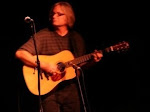I spent last week at Steve Kaufman’s award-winning Acoustic Kamp, teaching guitar to around 150 guitarists, jamming with campers, and performing with current and past musical partners. It was Flatpicking, Banjo, and Mandolin week, which you might think would be dominated by bluegrass pickers and jams, but the presence of Celtic guitarist Tony McManus, Italian flatpicker Beppe Gambetta, jazz chord–solo specialist John Carlini, old-time oriented flatpickers Robin Kessinger and Eric Thompson, theory buff Mike Kaufman, and Swiss new acoustic powerhouse Uwe Kruger kept things lively and varied.
I arrived a day early to get settled in, just in time to join Steve’s Saturday night jam, the final event of the previous week’s camp, and ended up in a wonderful four-guitar jam with Rolly Brown, Mark Cosgrove, and Jeff Jenkins in a room that was being used by luthiers Ken and Virginia Miller, providing us with a ready store of wonderful guitars to sample. An auspicious start to the week.
Kaufman Kamp is organized a bit differently than other camps I’ve taught at. Every camper is assigned to a class, based on their level and experience, and this week there were eight guitar classes, which ranged from a maximum of 20 to a cozy 11. There were also eight guitar instructors, and every class rotated through the instructors, spending two hours with each one. (There was also a Guitar 101 class taught by Cindy Gray for total “which end do I blow in?” beginners.) So I got to see every guitar student in camp, but only for a couple hours. This provides the campers with a helping of each teacher’s wisdom but doesn’t provide much time for in-depth instruction.
However, the daily morning and afternoon classes are just part of the curriculum. There are also slow, medium, and “genre” jams (I co-facilitated a Celtic jam with mandolin instructor Robin Bullock) as well as a Tune of the Day group. These organized picking parties are intended for all instruments and were led by Casey Henry and Keith Yoder. (Casey, a great Scruggs-style banjo player and the youngest instructor at Kamp, seemed to be working 30 hours a day. In addition to teaching the Mandolin 101 and Banjo 101 classes, and leading jams a couple times a day, she also organized the Saturday band scramble and guested on numerous staff concerts.)
Evenings are reserved for staff concerts, which are bookended by open mics for the campers. I was fortunate to have a few performing pals also teaching. In addition to guitarist Eric Thompson, Bill Evans was teaching at Banjo Kamp, and John Reischman was one of the all-star mandolin instructors. We had a great time guesting on each other’s sets, but, of course, part of the fun of these events is getting to play with musicians you don’t normally play with, whether in an impromptu jam or a barely rehearsed onstage performance. I got to try to match pickstrokes with Beppe Gambetta on a blazing version of “Ride the Wild Turkey” and to accompany Yoder and Kamp sensation Marcy Each on a laconic, folky version of “Under the Boardwalk.” (Each’s gorgeous, soulful singing and songwriting was the talk of the dining hall—calling her a combination of Norah Jones and Gillian Welch describes her without really doing her justice.)
And while I enjoyed listening to all of the concerts, I was quite unprepared for the final act of the week: the Kruger Brothers. I’d met Uwe and Jens in Switzerland in the early ’90s at an Alpine country music festival while on tour with Tim O’Brien, and I knew they were great musicians, mostly from seeing them deliver a few pyrotechnic performances at MerleFest in the late ’90s. But I was unprepared for the depth of feeling, sophistication, and earnest soulfulness of their current music. Their seamless “suites” combine classical-sounding passages with folk/country songs and contemporary bluegrass instrumental work, resembling medleys that consist of thematically related banjo tunes, folk songs, classical études, old-time fiddle tunes, funky folkish rock and blues grooves, and wistful ballads, all interwoven with a symphonic eye to the overall arc of the piece.
The Krugers play with a virtuosity that is almost incomprehensible, even to accomplished peers, delivered without a hint of braggadocio and with a sense of joy and self-deprecating humor that seems intended not just as a way of “expressing themselves,” as some virtuosic and overtly emotional “romantic” music can be, but as a way to connect and communicate with their fellows. Jens is truly one of the greatest stringed instrumentalists alive, and his banjo technique is mind-boggling, equaled only by Béla Fleck and Noam Pikelny. And the Krugers’ classical insertions seem totally at home with the rest of their music and never descend to the level of musical chest-thumping. They use what they’ve learned from classical composers to expand and personalize their music, not as a macho display, a way to distinguish themselves from an audience mostly made up of amateur musicians, or to simply make people think “Wow, how did they do that? We certainly got our money’s worth tonight.” What the Kaufman Kamp audience got last Friday night, and all week, while of great value, is exactly the kind of thing that money can’t buy.
Sunday, July 5, 2009
Subscribe to:
Post Comments (Atom)




No comments:
Post a Comment